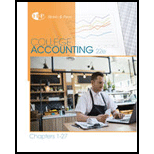
Concept explainers
Income taxes are a unique expense of the corporate form of business.
Indicate whether the given statement is true or false.
Answer to Problem 1TF
The given statement is true.
Explanation of Solution
Corporation: The form of business entity ,which is incorporated by state law into a separate legal entity, owned by stockholders, and managed by board of directors elected by stockholders, is referred to as corporation.
Description: Corporate form of organizations incur income tax expense but the sole proprietorships and partnerships do not. Corporation has to pay tax because it is recognized as a separate taxable unit. Stockholders also pay the taxes on their share of earnings from the business. Proprietors or owners pay tax on the earnings from the sole proprietorship business. Similar to sole proprietors, partners pay tax on their share of partnership earnings. Hence, the statement is true.
Thus, the given statement is true, in stating that the income tax expense is unique for a corporate form of business organization.
Want to see more full solutions like this?
Chapter 21 Solutions
College Accounting, Chapters 1-27
- I need help with this general accounting question using the proper accounting approach.arrow_forwardCan you explain the correct methodology to solve this general accounting problem?arrow_forwardCan you help me solve this financial accounting problem using the correct accounting process?arrow_forward
- Please help me solve this general accounting question using the right accounting principles.arrow_forwardI need help finding the correct solution to this financial accounting problem with valid methods.arrow_forwardPlease provide the accurate answer to this general accounting problem using valid techniques.arrow_forward
- Please provide the accurate answer to this financial accounting problem using valid techniques.arrow_forwardI am looking for help with this general accounting question using proper accounting standards.arrow_forwardPlease provide the accurate answer to this general accounting problem using valid techniques.arrow_forward
- I need guidance on solving this financial accounting problem with appropriate financial standards.arrow_forwardI need help with this financial accounting question using the proper financial approach.arrow_forwardI need help with this general accounting question using standard accounting techniques.arrow_forward
 College Accounting, Chapters 1-27AccountingISBN:9781337794756Author:HEINTZ, James A.Publisher:Cengage Learning,
College Accounting, Chapters 1-27AccountingISBN:9781337794756Author:HEINTZ, James A.Publisher:Cengage Learning, EBK CONTEMPORARY FINANCIAL MANAGEMENTFinanceISBN:9781337514835Author:MOYERPublisher:CENGAGE LEARNING - CONSIGNMENTCentury 21 Accounting Multicolumn JournalAccountingISBN:9781337679503Author:GilbertsonPublisher:Cengage
EBK CONTEMPORARY FINANCIAL MANAGEMENTFinanceISBN:9781337514835Author:MOYERPublisher:CENGAGE LEARNING - CONSIGNMENTCentury 21 Accounting Multicolumn JournalAccountingISBN:9781337679503Author:GilbertsonPublisher:Cengage Intermediate Accounting: Reporting And AnalysisAccountingISBN:9781337788281Author:James M. Wahlen, Jefferson P. Jones, Donald PagachPublisher:Cengage Learning
Intermediate Accounting: Reporting And AnalysisAccountingISBN:9781337788281Author:James M. Wahlen, Jefferson P. Jones, Donald PagachPublisher:Cengage Learning





